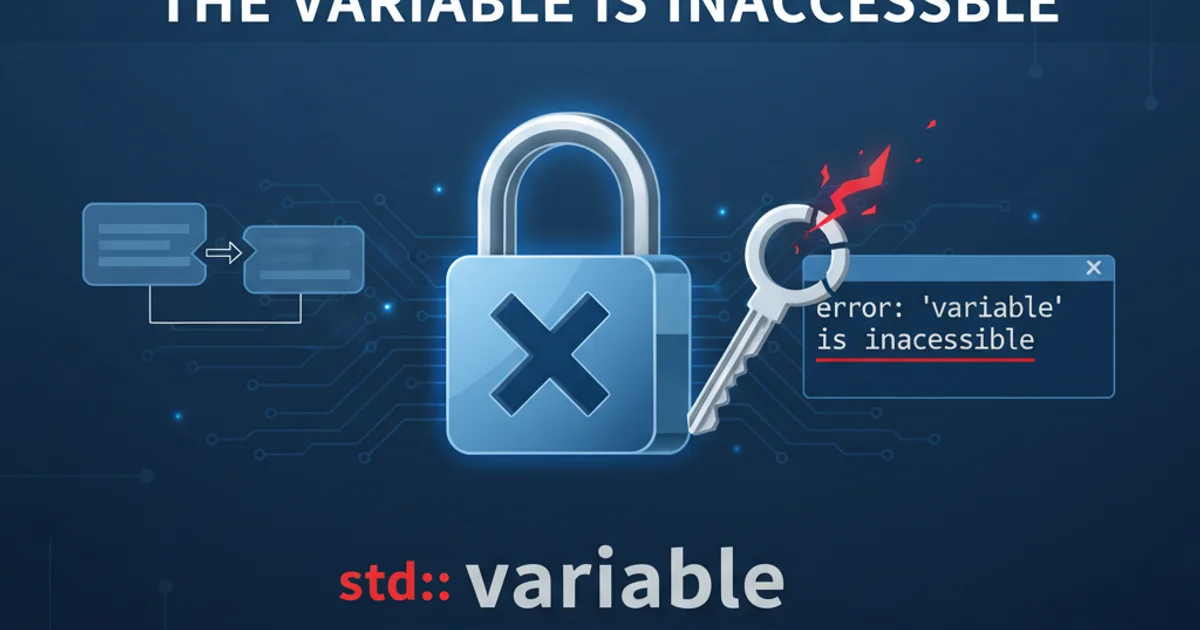The variable is inaccessible
Categories:
Understanding and Resolving 'The Variable is Inaccessible' in C++

Explore common causes and effective solutions for the 'variable is inaccessible' error in C++, focusing on scope, access specifiers, and object lifetime.
The 'variable is inaccessible' error in C++ is a common compilation issue that indicates you're trying to access a variable or member that is out of scope, has restricted access, or whose object has been destroyed. This article delves into the primary reasons behind this error and provides practical solutions to help you write robust and error-free C++ code. Understanding C++'s rules for scope, access control, and object lifetime is crucial for debugging and preventing such issues.
Understanding Scope and Lifetime
In C++, the scope of a variable defines the region of the program where the variable can be accessed. Variables declared within a block (e.g., inside a function or a loop) have local scope and are only accessible within that block. Once the execution leaves the block, these variables are typically destroyed, meaning their lifetime ends. Attempting to access such a variable after its lifetime has ended or outside its scope will result in an 'inaccessible' error.
flowchart TD
A[Variable Declaration] --> B{Inside Scope?}
B -- Yes --> C[Access Allowed]
B -- No --> D["Error: Inaccessible (Out of Scope)"]
C --> E{Object Lifetime Ended?}
E -- Yes --> D
E -- No --> F[Continue Using Variable]Flowchart illustrating variable accessibility based on scope and lifetime.
#include <iostream>
void myFunction() {
int localVariable = 10;
std::cout << "Inside myFunction: " << localVariable << std::endl;
}
int main() {
// localVariable is out of scope here
// std::cout << "Inside main: " << localVariable << std::endl; // ERROR: 'localVariable' is inaccessible
myFunction();
return 0;
}
Example of a variable being inaccessible due to local scope.
Access Specifiers and Class Members
When dealing with classes and objects, the 'variable is inaccessible' error often points to C++'s access specifiers: public, private, and protected. By default, class members are private, meaning they can only be accessed from within the class itself. Attempting to access a private or protected member directly from outside the class (e.g., from main or another unrelated function) will trigger this error. To allow external access, members must be explicitly declared as public.
#include <iostream>
class MyClass {
private:
int privateData;
public:
MyClass(int val) : privateData(val) {}
void displayPublicData() {
std::cout << "Private Data: " << privateData << std::endl;
}
};
int main() {
MyClass obj(42);
// obj.privateData = 100; // ERROR: 'privateData' is inaccessible
obj.displayPublicData(); // OK: Access via public member function
return 0;
}
Demonstration of inaccessible private class member.
classDiagram
class MyClass {
-int privateData
+MyClass(int val)
+void displayPublicData()
}
main --|> MyClass : uses
main ..> MyClass : tries to access privateData
MyClass -- privateData : has
displayPublicData -- privateData : accessesClass diagram showing public and private member access.
Resolving Inaccessibility Issues
To resolve 'variable is inaccessible' errors, first identify the context of the variable. If it's a local variable, ensure you're accessing it within its declared scope. If it's a class member, check its access specifier. For private or protected members, you typically need to provide public member functions (getters/setters) to interact with them from outside the class. For variables whose lifetime has ended, consider passing them by reference or pointer, or returning them from a function, ensuring the caller manages their lifetime appropriately.
public just to resolve accessibility errors. This breaks encapsulation, a core principle of object-oriented programming, and can lead to less maintainable and more error-prone code. Use public access judiciously.1. Identify the Variable's Declaration
Locate where the inaccessible variable is declared in your code. This will help you understand its scope and access level.
2. Check Variable Scope
Determine if you are trying to access a local variable outside its block. If so, either move the access point inside the scope or adjust the variable's declaration to a broader scope (e.g., global, class member).
3. Review Class Access Specifiers
If the variable is a class member, check if it's declared as private or protected. If external access is required, consider adding public getter/setter methods or making the member public if appropriate for the design.
4. Consider Object Lifetime
If you're dealing with pointers or references, ensure the object they point to or refer to still exists and hasn't been deallocated or gone out of scope.